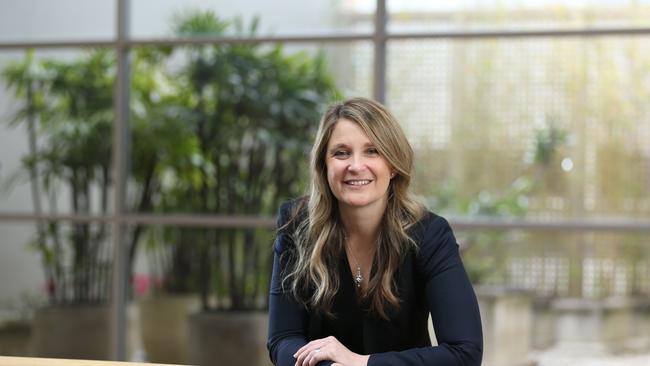COVID reveals NBN shortfalls and pricing ‘mismatch’, says Optus CEO Kelly Bayer Rosmarin
Large spikes in data usage through the COVID crisis demonstrate a ‘mismatch’ in the NBN pricing system, says Optus CEO.

Optus CEO Kelly Bayer Rosmarin has endorsed wholesale changes to the NBN model, including looking at making major data guzzling websites contribute to the cost of the network, during her first major address to the business community as head of the telecom giant.
Speaking at a Trans-Tasman Business Circle event on Tuesday Ms Bayer Rosmarin, who became CEO in April, said that the large spikes in data usage through the COVID crisis had demonstrated the “mismatch” in the NBN pricing system.
“I think COVID-19 and the rapid increase in data consumption have shown some of the challenges of the current model of CVC charging where all of us provide customers with a fixed price for access to their internet, but then the NBN charges us on a variable basis,” she said.
“Clearly that creates a mismatch that was brought to the surface through COVID.
“And so it’s a wonderful opportunity for us in the industry to consult with one another and design an even better system moving forward.”
Part of that better system could include a contribution made by major data using websites, Ms Bayer Rosmarin said.
Streaming services have come under scrutiny for the amount of bandwidth they occupy at peak times, which often results in slower internet speeds for NBN users in the evenings.
“It does not have to be just the retail service providers and the NBN involved in this, there are plenty of others who drive data consumption who could also contribute,” she said.
“For example, if they were to stream at higher bit rates – they might want to contribute to the infrastructure that needs to be built to accommodate that.”
It is reminiscent of the net neutrality issue that gripped the US in 2017, when internet service providers successfully lobbied to be allowed to charge consumers extra for accessing bandwidth-hogging websites, and not just for the data they use.
But Ms Bayer Rosmarin told The Australian that she didn’t want to throttle access to websites, only ensure that the costs of providing internet was more equitably spread.
“There are some people enjoying 4k or 8k streaming – but that increases prices for everybody, so that a tiny minority of people can benefit,” she said.
“I am not looking at blocking access … I think the industry could agree on a bit rate and look at contributions that could be made above it.
Solve the problem
“I think we can come up with a better, more equitable solution. Instead of waiting for a big blow out, the industry should come together proactively and solve the problem.”
Ms Bayer Rosmarin also told the Trans-Tasman Business Circle that she wants the industry to proactively work towards improving the experience of NBN customers, which she views as the biggest problem currently facing the network.
“I think the number one thing is that we improve the customer experience and make the whole process surrounding the NBN better, that’s the first path to profitability,” she said, adding that she does not believe a bolstered NBN would threaten Optus’s new 5G home internet business.
“We’ve always maintained that there’s room for multiple technologies here, they’ll suit different customers at different stages in their life cycle, or based on their situation.
“We’ve also been on record for a long time saying that the primary avenue we want to work with the NBN on is improving customer experience.
“We think the debate in the industry has been too narrow and about the price.
Make it work better
“But actually if we all concentrated on giving customers a better experience in connecting to and remaining connected to NBN … we actually think that’s the path to a sustainable, profitable NBN in our industry because that would eliminate a huge number of support calls, follow-ups, technicians being sent out to homes multiple times.”
Ms Bayer Rosmarin also addressed Optus’s long standing rivalry with Telstra during the event following a federal court dismissal of legal action taken by Telstra over an Optus advertising campaign that claimed the Optus network was covering more of Australia than ever before.
“We’ve spent a lot of money and effort closing that gap to Telstra and delivering our customers a great network,” she said.
“It’s no wonder to me that Telstra was a bit sensitive about the fact that we have closed the gap – they charge customers a lot more for a service that they could enjoy, that’s just as good on Optus, and they justify their premium based on having a superior network.”
“So when the gap gets closed, they get upset about it.”
Tight lipped on the issue of sports rights, Ms Bayer Rosmarin said Optus would cultivate customer loyalty against Telstra and a newly formed Vodafone-TPG by investing in digital experiences.
“We added a fitness channel – Optus sport fitness – during COVID and more than 10 per cent of our 800,000 subscribers have tried a fitness course,” she said.
“Our goal is to follow what our customers want and Optus sport fitness has been a really interesting experiment that worked, so I think we will look to more like that.
“Our customers value it and we will head where they are headed.”






To join the conversation, please log in. Don't have an account? Register
Join the conversation, you are commenting as Logout